Unit 12 What did you do last weekend-Section A 1a-1c 2课件(共49张PPT)
文档属性
| 名称 | Unit 12 What did you do last weekend-Section A 1a-1c 2课件(共49张PPT) | 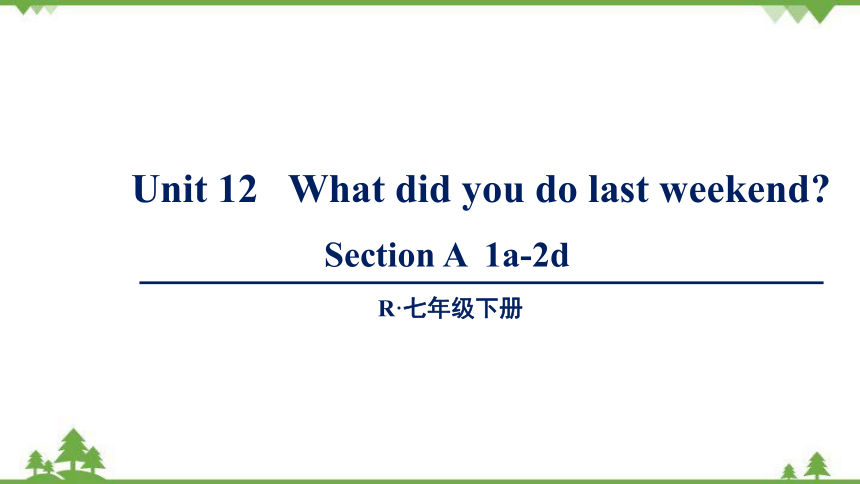 | |
| 格式 | ppt | ||
| 文件大小 | 74.6MB | ||
| 资源类型 | 教案 | ||
| 版本资源 | 人教新目标(Go for it)版 | ||
| 科目 | 英语 | ||
| 更新时间 | 2022-06-05 15:45:24 | ||
图片预览


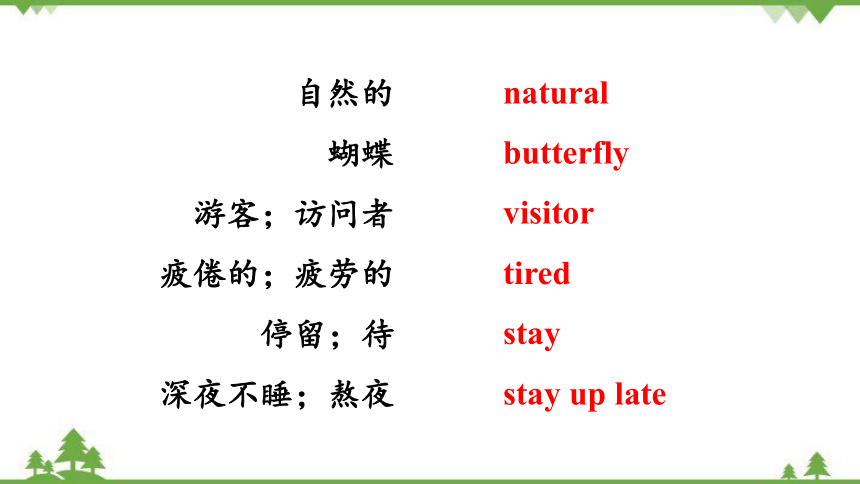
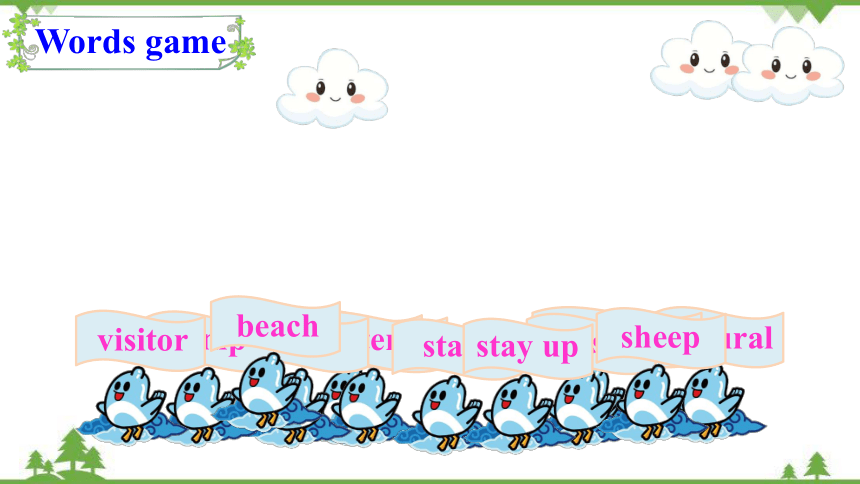
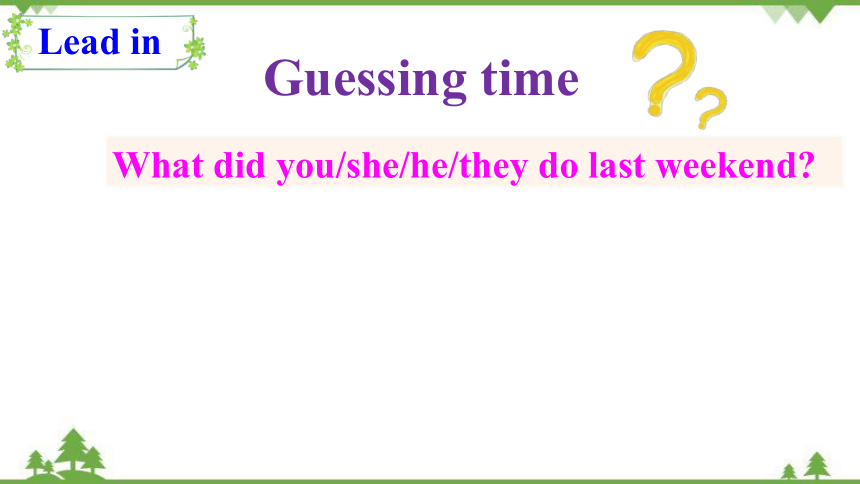
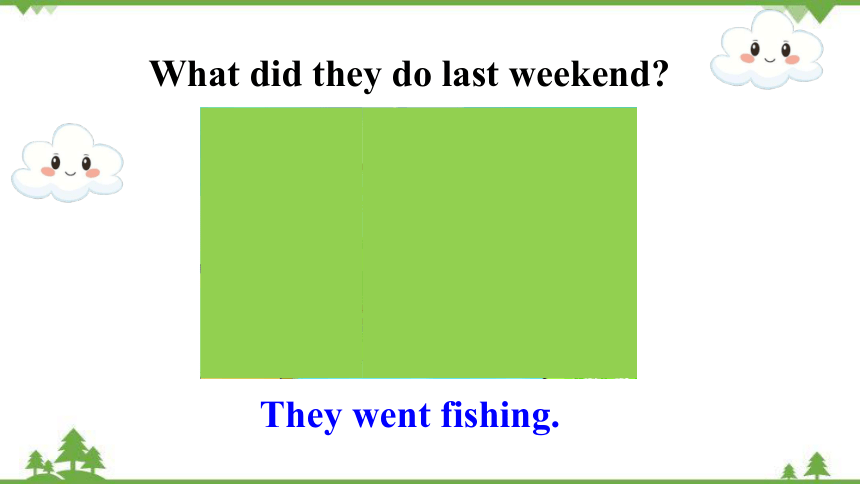
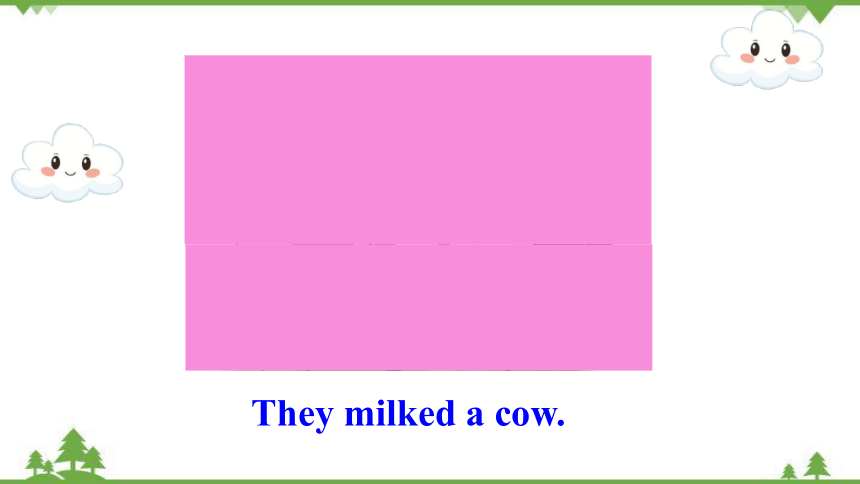
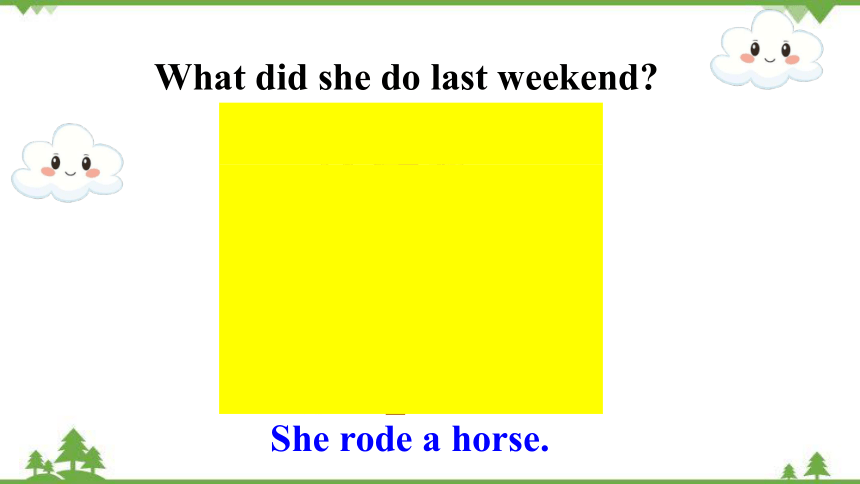
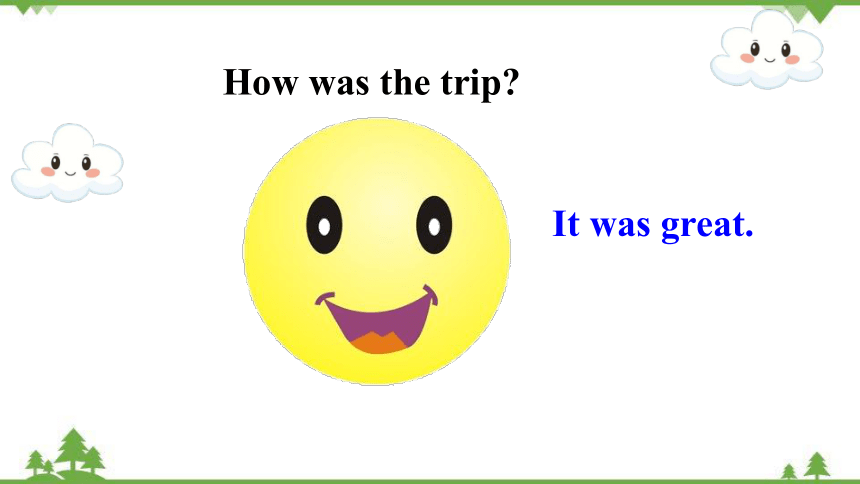
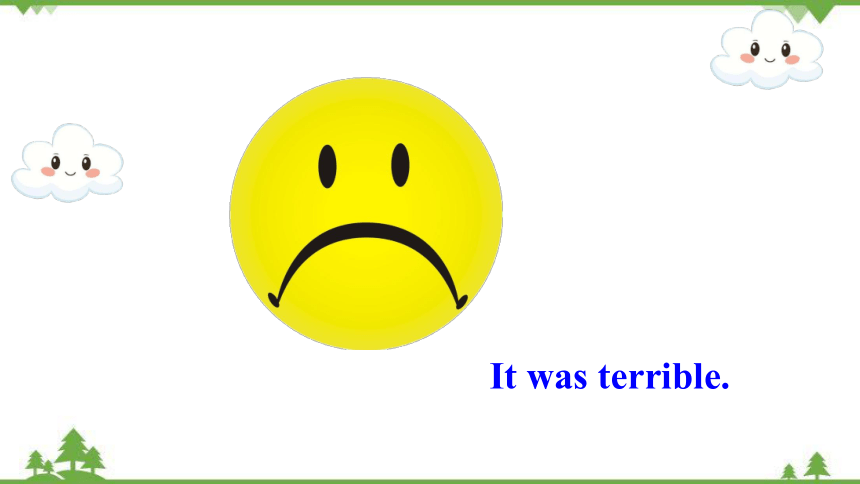
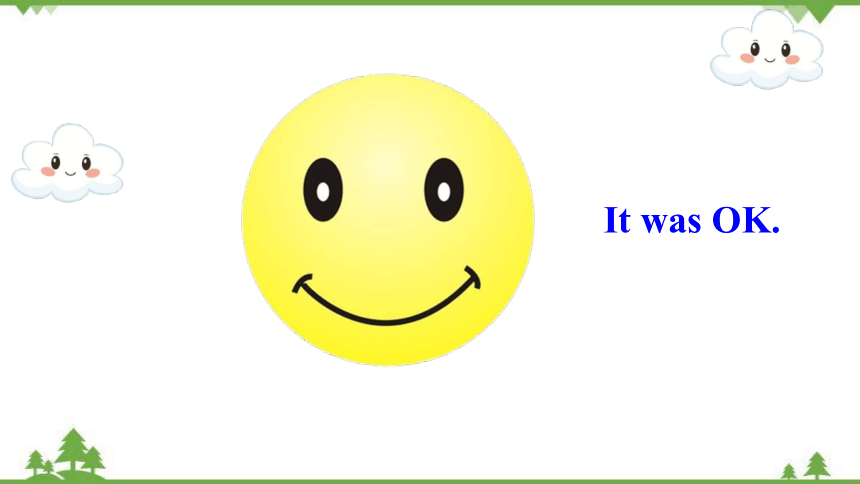
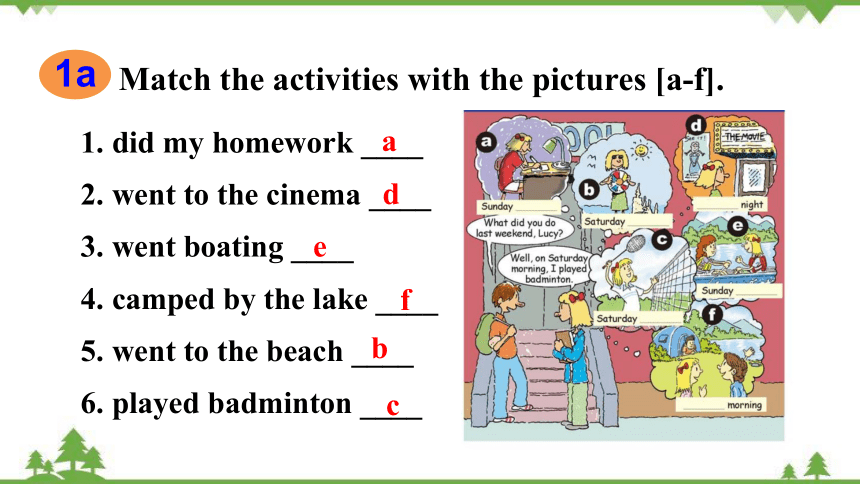
文档简介
(共49张PPT)
Unit 12 What did you do last weekend
R·七年级下册
Section A 1a-2d
Review
扎营;搭帐篷
湖;湖泊
海滩;沙滩
羽毛球运动
羊;绵羊
作为;当作
camp
lake
beach
badminton
sheep
as
自然的
蝴蝶
游客;访问者
疲倦的;疲劳的
停留;待
深夜不睡;熬夜
natural
butterfly
visitor
tired
stay
stay up late
natural
badminton
lake
butterfly
tired
as
camp
sheep
beach
visitor
Words game
stay
stay up
Lead in
What did you/she/he/they do last weekend
Guessing time
What did they do last weekend
They went fishing.
They milked a cow.
What did she do last weekend
She rode a horse.
How was the trip
It was great.
It was terrible.
It was OK.
1a
Match the activities with the pictures [a-f].
1. did my homework ____
2. went to the cinema ____
3. went boating ____
4. camped by the lake ____
5. went to the beach ____
6. played badminton ____
a
d
e
f
b
c
Language points
1. —What did you do last weekend, Lucy
—Well, on Saturday morning, I played badminton.
问句是一个含有一般过去时态的特殊疑问句, 其中的助动词did是do的过去式。
注意:句子中用了助动词did时,后面的动词要用原形。
weekend为名词,意为“周末”,通常指星期六和星期天两天。
对应词:weekday 工作日(即上课或上班的日子),通常指星期一至星期五的时间。
2. last weekend 上周末
on weekends 在周末
on weekdays 在工作日
play与球类和棋类名词连用,表示“打/踢……球;下……棋”时,棋类和球类名词前不加任何冠词。
3. play
例如:play chess 下象棋 play volleyball 打排球
play football 踢足球 play basketball 打篮球
而当play与乐器名词连用时, 乐器前必须加定冠词the。
play the piano 弹钢琴
play the violin 拉小提琴
1b
Listen and write the day, morning, afternoon or night below each picture.
a. Sunday ____________
b. Saturday ____________
c. Saturday ____________
d. ____________ night
e. Sunday ____________
f. ____________ morning
night
afternoon
morning
Saturday
afternoon
Sunday
Listen again and fill in the blanks.
Bob: Hey, Lucy.
Lucy: Hi, Bob.
Bob: _______ was your weekend
Lucy: It was great.
Bob: So, what ______ you ______
Lucy: Well, ______ Saturday morning, I _______
badminton. In the afternoon, I _________ the
How
did
do
on
played
went to
beach, and at night, I _________________.
Bob: Cool. What about Sunday
Lucy: In the morning, I _______ by the lake with my
classmates. In the afternoon, we ____________,
and at night, I _________________.
went to the cinema
camped
went boating
did my homework
Bob: Hey, Lucy.
Lucy: Hi, Bob.
Bob: How was your weekend
Lucy: It was great.
Bob: So, what did you do
Lucy: Well, on Saturday morning, I played badminton.
In the afternoon, I went to the beach, and at
Tapescripts:
night, I went to the cinema.
Bob: Cool. What about Sunday
Lucy: In the morning, I camped by the lake with my
classmates. In the afternoon, we went boating,
and at night, I did my homework.
1c
Role-play. Student A is Lucy. Student B asks Lucy about her weekend.
What did you do last weekend, Lucy
Well, on Saturday morning, I played
badminton.
Play roles
What did you do last weekend, Lucy
Well, on…, I...
Ask and answer.
Talk about your weekend with your partners.
A: What did you do last weekend
B: On___________, I___________.
2a
Listen and underline the words you hear.
1. I visited my (aunt / grandma).
2. I did (my homework / sports).
3. I studied for the (English / math) test.
4. I went to a (farm / beach).
5. I fed some (sheep / cows).
_____________
_______
_____
_____
2b
Listen again. Write C for Carol, J for Jack or B for Becky next to the statements in 2a.
B
B
C
J
J
1. ___ I visited my grandma.
2. ___ I did my homework.
3. ___ I studied for the English test.
4. ___ I went to a farm.
5. ___ I fed some cows.
Listen and fill in the blanks.
Last weekend,
Becky _____________________,
and she ____________________.
Carol _______________ and ____________
________________.
Jack ______________ and _______________.
visited her grandma
did her homework
stayed at home
studied for
went to a farm
fed some cows
the English test
Teacher: So, did everyone have a good weekend
Students: Yeah, we did, Ms. Clark!
Teacher: Good. What did you do last weekend,
Becky
Becky:
Tapescripts:
I visited my grandma, and I did my
homework.
Teacher: Great. And how about you, Carol Did you
go out
Carol:
Teacher: Wow, good for you. Jack, how about you
Where did you go
Jack:
Teacher: Sounds like you had fun.
No, I stayed at home. I studied for the
English test.
I went to a farm, and I fed some cows.
2c
Student A asks questions with who, what or where and Student B answers. Then change roles.
Becky did.
Who visited her grandma
Jack Mary Lily
watched TV went to a zoo went to a farm
took a walk went boating milked the cows
Make conversations.
Who …
What did …do
Where did …go
…did.
He/ She…
He/ She went to…
2d
Role-play the conversation.
Listen and answer the questions.
1. How was Lisa’s weekend
2. Where did Lisa work as a guide
3. What did she do there
4. Why is Paul tired now
1. How was Lisa’s weekend
2. Where did Lisa work as a guide
It was great.
At the Natural History Museum.
3. What did she do there
4. Why is Paul tired now
She told the visitors about the butterflies and their living habits.
Because he stayed up late to watch the soccer game.
Paul: Hi, Lisa. How was your weekend
Lisa: Great, thanks.
Paul: What did you do
Lisa: I worked as a guide at the Natural History
Museum.
Paul: Really How interesting!
how 引导的感叹句
Lisa:Yeah, it was fun. They have a butterfly house
with over 200 kinds of butterflies! I told the
visitors about them and their living habits. Did
you have a good weekend
Paul:Yeah, it was good, but I’m kind of tired now. I
stayed up late to watch the soccer game.
蝴蝶
介词,
超过,多余
生活习惯/习性
深夜不睡;熬夜
Listen and fill in the blanks according to 2d.
Last weekend, Lisa _______ _____ a guide at the Natural History Museum. There is a butterfly house ______ ______ 200 kinds of butterflies in the __________. Lisa ______ the _________ about the butterflies and their ________ ______. Paul had a _________ weekend but he ______ kind of _______, because he ______ ______late ______ ________ the soccer game.
worked as
with
over
museum
told
visitors
living habits
good
was
tired
stayed up
to
watch
Language points
1. How interesting! 多么有趣啊!
句型结构:How + adj./adv.(+主语+谓语)!
感叹句表示喜、怒、哀、乐等强烈情感。
本句为how引导的感叹句, 后面省略it was。
例句:她唱得多好呀!
How well she sings!
2. They have a butterfly house with over 200 kinds
of butterflies!
kind在此作名词, 意为“种类, 同类”。
常用短语:
a different kind of 一种不同的
all kinds of 各种各样的
3. I told the visitors about them and their living habits.
tell sb. about sth. 告诉某人关于某事
told 是 tell的过去式。意为“告诉,说;辨别;吩咐;讲述”。
例句:马玲告诉我关于她的假期的事情。
Ma Ling told me about her holiday.
living 此处为动词 live 的动名词形式。
4. living habits 生活习惯/习性
例句:他们在月球上没有发现任何活着的东西。
They didn’t find any living things on the moon.
living作形容词, 意为“活着的”。
5. Did you have a good weekend 你周末过得愉快吗
have a good weekend 周末过得愉快
have a good rest 好好休息
have a good time/have fun 玩得高兴
have a good trip 旅途愉快
6. I stayed up late to watch the soccer game.
stay up late意为“深夜不睡;熬夜”。stay作不及物动词, 意为“停留;待”。
例句:我熬夜一直到凌晨两点。
I stayed up late until two o’clock in the morning.
拓展:与stay相关的常见短语
stay in 待在室内;不外出
stay at home 待在家里
stay out 待在户外
stay away from 离开, 不接近
stay up 熬夜
Exercise
单项选择。
1. — ________
— He did some reading at home.
A. What does your father do yesterday evening
B. What does your brother do in the school
C. What did your brother do last weekend
D. Where did your brother go last Sunday
2. My mum _______ sports yesterday morning.
A. didn’t B. no did
C. doesn’t D. didn’t do
3. ______ exciting the movie is! It’s worth watching
(值得观看)again.
A. How an B. What an C. How
4. —Who spent the weekend with you
— Mary _______.
A. do B. did C. does D. doing
5. I didn’t get up on time this morning, because I
_______ too late last night.
A. stayed at B. stay up
C. stayed up D. wake up
6. She flew a kite last Saturday. (对画线部分提问)
______ _______ ______ _______ last Saturday
What did she do
My schoolbag has ________ ________ ________ books.
all kinds of
7. 我的书包里有各种各样的书。
Unit 12 What did you do last weekend
R·七年级下册
Section A 1a-2d
Review
扎营;搭帐篷
湖;湖泊
海滩;沙滩
羽毛球运动
羊;绵羊
作为;当作
camp
lake
beach
badminton
sheep
as
自然的
蝴蝶
游客;访问者
疲倦的;疲劳的
停留;待
深夜不睡;熬夜
natural
butterfly
visitor
tired
stay
stay up late
natural
badminton
lake
butterfly
tired
as
camp
sheep
beach
visitor
Words game
stay
stay up
Lead in
What did you/she/he/they do last weekend
Guessing time
What did they do last weekend
They went fishing.
They milked a cow.
What did she do last weekend
She rode a horse.
How was the trip
It was great.
It was terrible.
It was OK.
1a
Match the activities with the pictures [a-f].
1. did my homework ____
2. went to the cinema ____
3. went boating ____
4. camped by the lake ____
5. went to the beach ____
6. played badminton ____
a
d
e
f
b
c
Language points
1. —What did you do last weekend, Lucy
—Well, on Saturday morning, I played badminton.
问句是一个含有一般过去时态的特殊疑问句, 其中的助动词did是do的过去式。
注意:句子中用了助动词did时,后面的动词要用原形。
weekend为名词,意为“周末”,通常指星期六和星期天两天。
对应词:weekday 工作日(即上课或上班的日子),通常指星期一至星期五的时间。
2. last weekend 上周末
on weekends 在周末
on weekdays 在工作日
play与球类和棋类名词连用,表示“打/踢……球;下……棋”时,棋类和球类名词前不加任何冠词。
3. play
例如:play chess 下象棋 play volleyball 打排球
play football 踢足球 play basketball 打篮球
而当play与乐器名词连用时, 乐器前必须加定冠词the。
play the piano 弹钢琴
play the violin 拉小提琴
1b
Listen and write the day, morning, afternoon or night below each picture.
a. Sunday ____________
b. Saturday ____________
c. Saturday ____________
d. ____________ night
e. Sunday ____________
f. ____________ morning
night
afternoon
morning
Saturday
afternoon
Sunday
Listen again and fill in the blanks.
Bob: Hey, Lucy.
Lucy: Hi, Bob.
Bob: _______ was your weekend
Lucy: It was great.
Bob: So, what ______ you ______
Lucy: Well, ______ Saturday morning, I _______
badminton. In the afternoon, I _________ the
How
did
do
on
played
went to
beach, and at night, I _________________.
Bob: Cool. What about Sunday
Lucy: In the morning, I _______ by the lake with my
classmates. In the afternoon, we ____________,
and at night, I _________________.
went to the cinema
camped
went boating
did my homework
Bob: Hey, Lucy.
Lucy: Hi, Bob.
Bob: How was your weekend
Lucy: It was great.
Bob: So, what did you do
Lucy: Well, on Saturday morning, I played badminton.
In the afternoon, I went to the beach, and at
Tapescripts:
night, I went to the cinema.
Bob: Cool. What about Sunday
Lucy: In the morning, I camped by the lake with my
classmates. In the afternoon, we went boating,
and at night, I did my homework.
1c
Role-play. Student A is Lucy. Student B asks Lucy about her weekend.
What did you do last weekend, Lucy
Well, on Saturday morning, I played
badminton.
Play roles
What did you do last weekend, Lucy
Well, on…, I...
Ask and answer.
Talk about your weekend with your partners.
A: What did you do last weekend
B: On___________, I___________.
2a
Listen and underline the words you hear.
1. I visited my (aunt / grandma).
2. I did (my homework / sports).
3. I studied for the (English / math) test.
4. I went to a (farm / beach).
5. I fed some (sheep / cows).
_____________
_______
_____
_____
2b
Listen again. Write C for Carol, J for Jack or B for Becky next to the statements in 2a.
B
B
C
J
J
1. ___ I visited my grandma.
2. ___ I did my homework.
3. ___ I studied for the English test.
4. ___ I went to a farm.
5. ___ I fed some cows.
Listen and fill in the blanks.
Last weekend,
Becky _____________________,
and she ____________________.
Carol _______________ and ____________
________________.
Jack ______________ and _______________.
visited her grandma
did her homework
stayed at home
studied for
went to a farm
fed some cows
the English test
Teacher: So, did everyone have a good weekend
Students: Yeah, we did, Ms. Clark!
Teacher: Good. What did you do last weekend,
Becky
Becky:
Tapescripts:
I visited my grandma, and I did my
homework.
Teacher: Great. And how about you, Carol Did you
go out
Carol:
Teacher: Wow, good for you. Jack, how about you
Where did you go
Jack:
Teacher: Sounds like you had fun.
No, I stayed at home. I studied for the
English test.
I went to a farm, and I fed some cows.
2c
Student A asks questions with who, what or where and Student B answers. Then change roles.
Becky did.
Who visited her grandma
Jack Mary Lily
watched TV went to a zoo went to a farm
took a walk went boating milked the cows
Make conversations.
Who …
What did …do
Where did …go
…did.
He/ She…
He/ She went to…
2d
Role-play the conversation.
Listen and answer the questions.
1. How was Lisa’s weekend
2. Where did Lisa work as a guide
3. What did she do there
4. Why is Paul tired now
1. How was Lisa’s weekend
2. Where did Lisa work as a guide
It was great.
At the Natural History Museum.
3. What did she do there
4. Why is Paul tired now
She told the visitors about the butterflies and their living habits.
Because he stayed up late to watch the soccer game.
Paul: Hi, Lisa. How was your weekend
Lisa: Great, thanks.
Paul: What did you do
Lisa: I worked as a guide at the Natural History
Museum.
Paul: Really How interesting!
how 引导的感叹句
Lisa:Yeah, it was fun. They have a butterfly house
with over 200 kinds of butterflies! I told the
visitors about them and their living habits. Did
you have a good weekend
Paul:Yeah, it was good, but I’m kind of tired now. I
stayed up late to watch the soccer game.
蝴蝶
介词,
超过,多余
生活习惯/习性
深夜不睡;熬夜
Listen and fill in the blanks according to 2d.
Last weekend, Lisa _______ _____ a guide at the Natural History Museum. There is a butterfly house ______ ______ 200 kinds of butterflies in the __________. Lisa ______ the _________ about the butterflies and their ________ ______. Paul had a _________ weekend but he ______ kind of _______, because he ______ ______late ______ ________ the soccer game.
worked as
with
over
museum
told
visitors
living habits
good
was
tired
stayed up
to
watch
Language points
1. How interesting! 多么有趣啊!
句型结构:How + adj./adv.(+主语+谓语)!
感叹句表示喜、怒、哀、乐等强烈情感。
本句为how引导的感叹句, 后面省略it was。
例句:她唱得多好呀!
How well she sings!
2. They have a butterfly house with over 200 kinds
of butterflies!
kind在此作名词, 意为“种类, 同类”。
常用短语:
a different kind of 一种不同的
all kinds of 各种各样的
3. I told the visitors about them and their living habits.
tell sb. about sth. 告诉某人关于某事
told 是 tell的过去式。意为“告诉,说;辨别;吩咐;讲述”。
例句:马玲告诉我关于她的假期的事情。
Ma Ling told me about her holiday.
living 此处为动词 live 的动名词形式。
4. living habits 生活习惯/习性
例句:他们在月球上没有发现任何活着的东西。
They didn’t find any living things on the moon.
living作形容词, 意为“活着的”。
5. Did you have a good weekend 你周末过得愉快吗
have a good weekend 周末过得愉快
have a good rest 好好休息
have a good time/have fun 玩得高兴
have a good trip 旅途愉快
6. I stayed up late to watch the soccer game.
stay up late意为“深夜不睡;熬夜”。stay作不及物动词, 意为“停留;待”。
例句:我熬夜一直到凌晨两点。
I stayed up late until two o’clock in the morning.
拓展:与stay相关的常见短语
stay in 待在室内;不外出
stay at home 待在家里
stay out 待在户外
stay away from 离开, 不接近
stay up 熬夜
Exercise
单项选择。
1. — ________
— He did some reading at home.
A. What does your father do yesterday evening
B. What does your brother do in the school
C. What did your brother do last weekend
D. Where did your brother go last Sunday
2. My mum _______ sports yesterday morning.
A. didn’t B. no did
C. doesn’t D. didn’t do
3. ______ exciting the movie is! It’s worth watching
(值得观看)again.
A. How an B. What an C. How
4. —Who spent the weekend with you
— Mary _______.
A. do B. did C. does D. doing
5. I didn’t get up on time this morning, because I
_______ too late last night.
A. stayed at B. stay up
C. stayed up D. wake up
6. She flew a kite last Saturday. (对画线部分提问)
______ _______ ______ _______ last Saturday
What did she do
My schoolbag has ________ ________ ________ books.
all kinds of
7. 我的书包里有各种各样的书。
同课章节目录
- Unit 1 Can you play the guitar?
- Section A
- Section B
- Unit 2 What time do you go to school?
- Section A
- Section B
- Unit 3 How do you get to school?
- Section A
- Section B
- Unit 4 Don't eat in class.
- Section A
- Section B
- Unit 5 Why do you like pandas?
- Section A
- Section B
- Unit 6 I'm watching TV.
- Section A
- Section B
- Review of Units 1-6
- Unit 7 It's raining!
- Section A
- Section B
- Unit 8 Is there a post office near here?
- Section A
- Section B
- Unit 9 What does he look like?
- Section A
- Section B
- Unit 10 I'd like some noodles.
- Section A
- Section B
- Unit 11 How was your school trip?
- Section A
- Section B
- Unit 12 What did you do last weekend?
- Section A
- Section B
